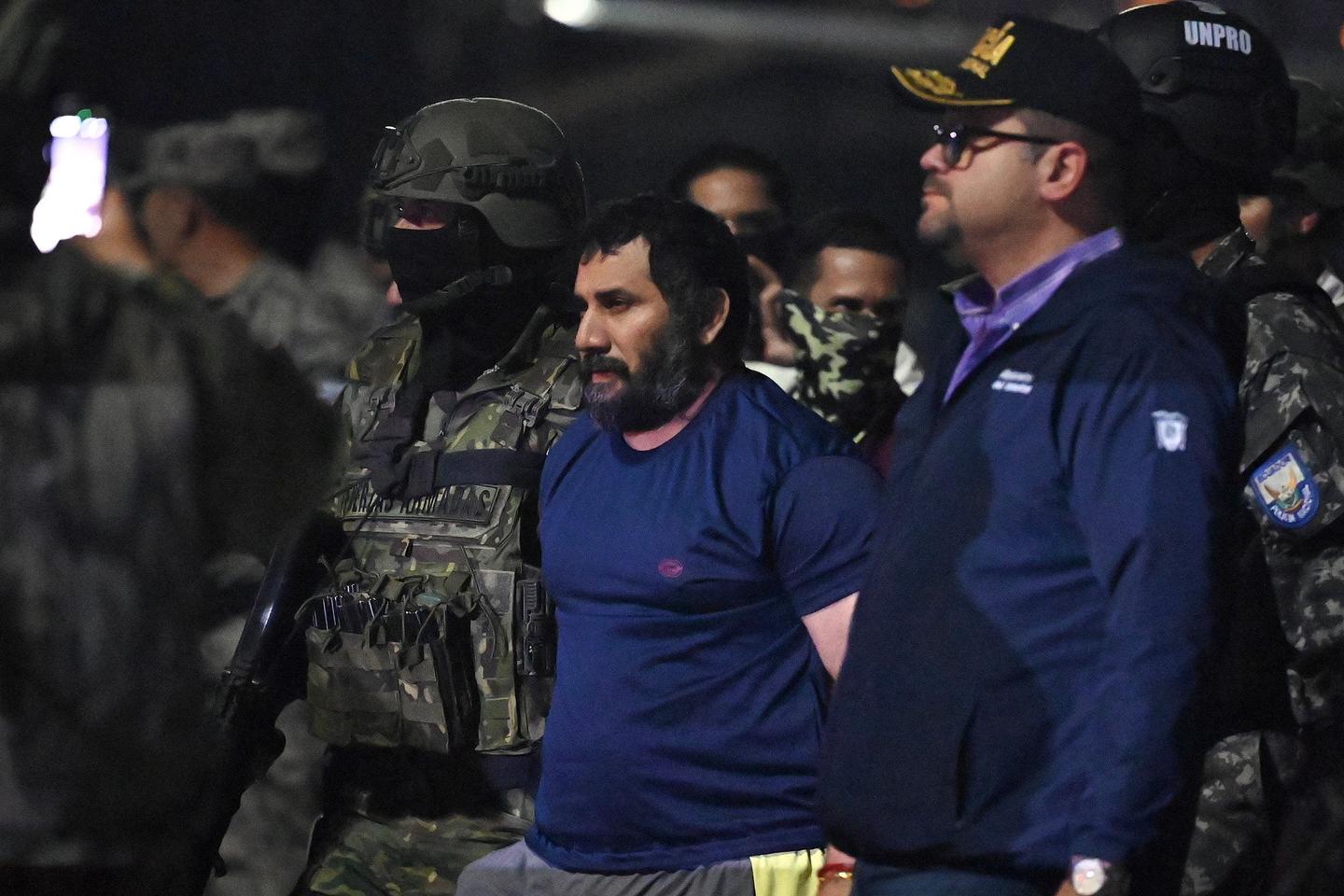The Rise and Fall of Adolfo Macias: Ecuador’s Drug Lord
Drug trafficker Adolfo Macias, alias Fito, is guarded by Ecuador’s Interior Minister John Reimberg (R) and military personnel upon arrival at the air base in Guayaquil, Ecuador, on June 25, 2025, after his recapture in Manta, Manabi Province. (MARCOS PIN / AFP)
Ecuador has been enduring a tumultuous surge of violent crime in recent years, largely attributed to the operations of drug traffickers vying for control of this strategically located nation. At the center of this turmoil is Adolfo Macias, also known as "Fito," the notorious leader of the "Los Choneros" gang. After a dramatic escape and a subsequent manhunt, Macias’s recent capture reignites conversations about the broader implications of narco-trafficking in Ecuador.
The Criminal Empire of Adolfo Macias
Macias, originally a taxi driver, transitioned into the world of organized crime and swiftly rose to prominence. He became the head of "Los Choneros," an organization notorious for its ruthless enforcement tactics and deep ties to international drug cartels, including Mexico’s infamous Sinaloa cartel and Colombia’s Gulf Clan.
In 2011, Macias was sentenced to 34 years in prison for serious crimes that included drug trafficking, murder, and organized crime. However, his imprisonment did not curtail his influence; rather, it seemed to amplify it. He allegedly held parties inside the prison, complete with mariachi bands and fireworks, showcasing his power even while incarcerated. Reports indicated that his prison cell was filled with luxury items and cash, indicative of his control within the prison system.
The Dramatic Jailbreak
In a stunning turn of events, Macias managed to escape from a maximum-security prison in Guayaquil in 2024. This runaway set off a tumultuous chain of violence across Ecuador, with chaos in prisons and streets. The situation led President Daniel Noboa’s administration to declare a state of "internal armed conflict" in an attempt to regain control.
The aftermath of Macias’s escape was marked by extreme violence, including bombings, hostage situations, and public assaults carried out by "Los Choneros" in retaliation against law enforcement’s efforts to recapture him. His disappearance had far-reaching implications for the stability and safety of Ecuador, ushering in a period of fear and uncertainty.
A Long-Awaited Recapture
After months evading capture, Macias was found in June 2025, hidden in a bunker beneath a luxurious house in Manta, a coastal town in Manabi Province. The operation to recapture him involved a massive coordination of police and military forces, executed without a single shot being fired. Upon his capture, President Noboa stated that the government would ensure Macias faces justice in the United States, where he is wanted on multiple charges related to drug trafficking and arms smuggling.
In a court appearance conducted via video link from his prison, Macias consented to extradition, becoming the first Ecuadorian to face such measures under recently enacted laws designed to bolster the fight against organized crime. This pivotal moment signified not only a personal defeat for Macias but also represented a broader commitment from Ecuadorian authorities to combat the pervasive influence of drug trafficking within the country.
The Violence of Gang Wars
The battle for control in Ecuador’s criminal underworld is intense and violent. The fight between rival gangs has caused a spike in violent crime, with Ecuadorian ports becoming critical nodes in the global cocaine trade. With more than 70% of cocaine produced worldwide passing through Ecuador, the stakes are high, and the government is finding it increasingly challenging to maintain control.
Macias’s gang, Los Choneros, has been at the nexus of this chaotic network, often clashing with rival factions resulting in bloodshed that spills into public spaces and further destabilizes the nation. Such gang wars have led to increased militarization of urban areas as government forces clash with criminals in a desperate bid for stability.
The Broader Implications
Macias’s story illustrates the complexities of drug trafficking in Ecuador, contextualizing his criminal career within a larger narrative of violence and systemic corruption. As the government continues its struggle against powerful cartels, Macias’s fate represents both a glimmer of hope for justice and a stark reminder of the deeply rooted issues facing Ecuador.
In light of increasing drug-related violence and corruption, international assistance and cooperation with neighboring countries will be vital for Ecuador to navigate this perilous landscape. The hard-fought capture of Adolfo Macias should thus be viewed not just as an individual victory for law enforcement but as part of a broader ongoing battle against organized crime in South America.


